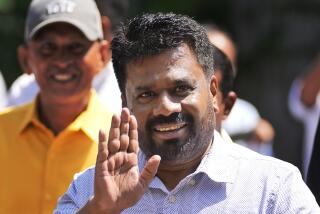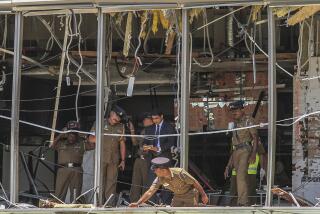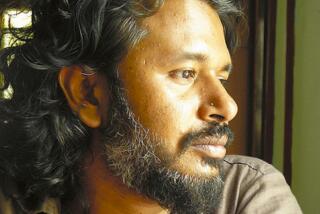Sri Lanka’s next task: Win peace
- Share via
NEW DELHI — Sri Lanka has won its quarter-century civil war against the rebel Tamil Tigers at a cost of billions of dollars, a crippled economy and more than 70,000 lives.
A central question now facing the bloodied island nation is whether it can win the peace by sparking reconciliation between its majority Sinhalese and minority Tamil ethnic populations, healing a rift that has seeped into almost every corner of society.
President Mahinda Rajapaksa took a first step Tuesday by speaking briefly in Tamil during a victory speech in parliament -- highly symbolic in the linguistically as well as ethnically divided nation -- while calling on fellow Sri Lankans to distinguish between the Tamil Tigers and the rest of the Tamil people.
With the Tigers gone, he said, “we all must now live as equals in this free country.”
In declaring victory this week, the army said it had routed the rebel forces, captured all former Tiger-held territory -- which at its peak covered a third of Sri Lanka -- and killed several leaders of the militant group, including founder Velupillai Prabhakaran.
Questions remained over exactly how the elusive leader was killed. Reports Monday that he’d been shot while trying to flee in an ambulance were inaccurate, the government said Tuesday, adding that he died in a fight with the army.
State television aired a grisly video of what it said was the leader’s body, the face bloated and what looked like a sizable bullet hole in the forehead. Periodically, someone’s hand entered the frame to shoo away flies.
The war’s final months saw thousands of innocent Tamil civilians killed while trapped between an army accused of firing indiscriminately and a rebel force accused of using the civilians as human shields. Both sides have denied those charges.
Tamils account for 12% and Sinhalese 74% of Sri Lanka’s 20 million people, according to the 2001 census. Though many Tamils worldwide opposed Prabhakaran’s brutal methods in seeking a Tamil homeland, including the use of suicide bombers and drug smuggling, many now fear the Sinhalese may exact revenge on Tamils.
“We obviously are very saddened by the news about Prabhakaran,” said Suren Surendiren, London-based spokesman for the British Tamils’ Forum, which claims 100,000 members. “We believe thousands of injured are not getting medical care.”
Plenty of advice
President Rajapaksa, elected in 2005, is in a good position to tackle the reconciliation challenge. As a hard-line leader who did what it took to win a war, he’s got the credentials to extend a hand to the other side without facing accusations of being soft on militants.
He has had no shortage of advice from Asian and Western envoys urging him to be magnanimous in victory. “The big question is whether he’ll listen,” said one South Asian diplomat. In his speech Tuesday, Rajapaksa pointedly warned foreigners not to meddle.
An early bridge-building step, analysts said, would be to streamline humanitarian aid and quickly allow Tamils to return home from displacement camps. This would help blunt suspicions that they’ll be locked in for years or that their lands will be redistributed to Sinhalese.
“For Tamils, land is crucial,” said a religious leader who asked not to be identified for fear of government reprisal. “It’s more important than anything.”
Another step would be to empower local councils, approved in 1987 but never implemented. Turning more power over to their districts would give Tamils a degree of autonomy in the northern and eastern parts of the country where they are in the majority.
Mohan Thangarajap, a Tamil working at a stock brokerage in Colombo, the capital, said the president’s speech was conciliatory and a good start. But he added that Rajapaksa might resist greater local control because it could spur calls to curtail his own sweeping powers.
Another step would involve addressing everyday indignities Tamils face, which they say can make them feel like second-class citizens.
Sinhalese and Tamil are both official languages under the constitution. In practice, however, most government business is conducted in Sinhalese, with little allowance made for those who speak only Tamil, some said.
“If your car is stolen or you lost your wallet and you go to a local police station, you may not find an officer to help you,” said Pradeep Jeganathan, an official with the Consortium for Humanitarian Agencies, a civic group. “And you sometimes have to sign statements you don’t understand.”
Furthermore, Tamils say, the onus is often on them at security checkpoints to prove they’re not terrorists, a demeaning process.
“They ask you dozens of questions,” said K.V. Ganeshan, 35, a rickshaw driver, speaking in Colombo a few weeks ago. “I say, ‘Why do you let the Sinhalese go and not me? I’m a Sri Lankan too.’ It makes people distrust the government.”
Government officials denied there was a problem. “There’s no discrimination at checkpoints, and no one has objections except maybe a few troublemakers,” said Lakshman Hulugalle, director general of the Media Center for National Security in Colombo. “And there’s no discrimination on language.”
An opportunity
Rajapaksa is known as a pragmatist, analysts said, which could cut both ways. He might cater to the Sinhalese majority he’s already popular with, instead of reaching out to a defensive and battered Tamil community.
Or he could decide to spend some of his political capital amassed by winning the war on reconciliation, elevating himself to statesman status.
“It’s a historic opportunity,” said Jehan Perera, executive director of the Colombo-based National Peace Council, a civic group. “But there are obstacles.”
One is Sinhalese nationalism, some said, which the government has fanned in order to win the war and justify high casualties. Another is the dominant role of the security forces after such a protracted conflict. Huge numbers of army, police and paramilitary fighters have been recruited. Reintegrating these trained killers, many of whom feel they deserve additional political clout, into an economically weak society presents a major challenge.
Also a concern is that fears of rogue Tiger units blending into society will be manipulated by the security apparatus to extend its mandate.
Though the Sinhalese now enjoy the upper hand, the British employed the Tamils as administrators over the majority, a long-standing injustice the Sinhalese felt able to reverse only after independence.
This distrust has sometimes taken brutal form, as during anti-Tamil riots in 1958, 1977 and 1983 in which thousands of Tamils were reported killed. In 1985, Tigers attacked a Buddhist shrine, killing 146 Sinhalese civilians.
“The ethnic divide is very deep,” said G. Parthasarathy, who was advisor on Sri Lanka to former Indian Prime Minister Rajiv Gandhi and who is now an analyst with the Center for Policy Research in New Delhi. “And many of these historic memories go back centuries. It’s quite a challenge.”
--
More to Read
Sign up for Essential California
The most important California stories and recommendations in your inbox every morning.
You may occasionally receive promotional content from the Los Angeles Times.










